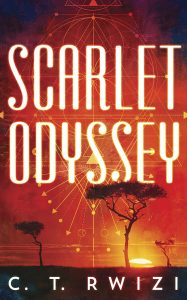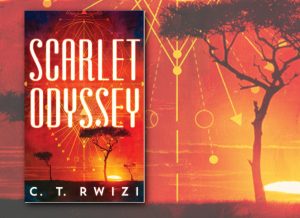SCARLET ODYSSEY by C. T. Rwizi (BOOK REVIEW)
 In Scarlet Odyssey, Rwizi has given us a rich and immersive world resonant of Africa with its equatorial jungles, huge navigable lakes and broad sweeping plains. Rwizi steps magnificently beyond the medieval-european paradigm of fantasy fiction that has been more than fulsomely explored in the decades since Lord of the Rings. This is not a short debut, but the story is still an opening salvo in what promises to be an enjoyable series. The book ends with an epilogue that hints for our protagonists, the best (or worst) is yet to come, so the reader had best buckle up for an absorbing ride.
In Scarlet Odyssey, Rwizi has given us a rich and immersive world resonant of Africa with its equatorial jungles, huge navigable lakes and broad sweeping plains. Rwizi steps magnificently beyond the medieval-european paradigm of fantasy fiction that has been more than fulsomely explored in the decades since Lord of the Rings. This is not a short debut, but the story is still an opening salvo in what promises to be an enjoyable series. The book ends with an epilogue that hints for our protagonists, the best (or worst) is yet to come, so the reader had best buckle up for an absorbing ride.
However, it is to the author’s credit, that throughout 500+ pages, the prose and the plot still feel lean and well-paced. We follow several different points of view as they coalesce around the central strand of Musalodi (Salo’s) perspective.
In its creative world building and thought provoking themes, Scarlet Odyssey put me in mind of both N.K.Jemsin’s The Fifth Season and Katherine Addison’s The Goblin Emperor.
The prologue introduces us to Salo in a moment of fearful cowardice that sets him apart from the spear wielding ass-kicking warrior of much traditional fantasy we’re used to. Instead we find a thinker, a technocrat, an artisan, a young man still struggling under the weight of his own past and his people’s ongoing disdain – though that does not stop them depending on his skills.
The warrior role sits instead with Ilapara, a young woman trying to carve out a future as a mercenary far away from the homeland she shared with Salo, a place where her gender excluded her from such martial arts.
The third main character (who we do not meet until page 183) is Isa, the northern princess thrust by circumstance into a politically pivotal role in a nation where old certainties are not so much crumbling as being crushed.
The story gradually braids their three stories together, while a cloud of minor characters orbit them with threats and support.
The world
I found the elaborate magic system quite fascinating, a kind of techno-mysticism in a world where mind stones and tronic monsters mix elements of magic and science fiction.
At its heart is the need for magic-using Mystics to construct a personal axiom in order to awaken their talent and access the reserves of power available to them. The axiom made me think of programmes in computing and heat engines in thermodynamics, a thought machine made up of lines of prose (or lines of code?) that can channel red magic energy from its source (the moon or the land) for efficient release in spells. A mystic’s power is not then simply a matter of how much energy they can channel, but how efficiently and quickly their axiom can convert it, and what spells they can drive with that harnessed magical potential. The spells themselves come under six different crafts, including healing and void craft, which ensures diversity of powers and specialisations.
This internally consistent level of intricacy may not fire everyone’s curiosity as much as it did mine, but it does mean Riwzi has an explanation for why a novice mystic could go toe to toe with more experienced and malevolent magic users (something I found lacking for example in Harry Potter).
The culture of Rwizi’s continent is wonderfully diverse. Salo’s homeland of the Yerezi plains is a matriarchy with magic use being the prerogative of women, mainly because men are considered temperamentally unsuited to wielding such power with the appropriate wisdom and restraint. The cruel and ferocious male warlords that dominate neighbouring Umadiland, rather prove the Yerezi point, and it did make me think of our own world where countries with female leaders seem to be weathering the storm of covid somewhat better than nations in the grip of more power driven populist male leaders.
Isa’s Kiyonte kingdom is like a decaying empire of Rome, China or Persia living under a curse that endures from its own creation, a curse that separated its people into rival clans. Traitors conspire to take their world back to the imagined perfection of a past it appears they should be repudiating and quite a few people who think themselves kings and queens, turn out to be pawns. One of the Isa’s ambitions is to wipe out the marks that make her people instantly recognisable to each other as crocodiles, or elephants or any of the other nine clans – a short-cut to ending division and murderous antipathy.
The Characters
Salo, Isa and Ilpara make for an engaging and diverse trio of leading characters, but they are well supported by a small constellation of minor characters. The Anchorite, a grizzled old woman mystic who reminded me of Pai Mei, from Kill Bill volume 2. Niko, the Yerezi ranger, friend and defender for whom Salo’s feelings might best be described as complicated. Then there is the curious part-robocop, part-terminator, part-golem, part tin-man companion that Salo acquires on his journey.
Ranged against them all is an array of richly imagined villains, hiding behind colourful aliases. The Maidservant, Black river, Dark Sun and more. The moment where The Maidservant and Black River arrive in a sleepy little village oblivious to the horror they are about to inflict reminded me of a pair of bad guy gunfighters riding into a timber framed town in a Sergio Leone western.
The writing
Scarlett Odyssey has that great blend of writing that is for the most part unobtrusively good, smoothly easing you into the depths of the story, and yet still seasoned with lines that sparkle enough to make you stop to admire them.
“…it seems to Kelafelo that their cries tear rents into the sky itself, for heavy rain soon breaks, even before the carnage is over.”
“She wears a towering orange head wrap and a quick, beguiling smile that says Let’s be friends, and in the same breath, I’m a better human than you.”
“She has one of those faces no formula for beauty can conceive, only a happy accident of birth.”
Then there are lines to laugh at, such as this oblique hint at what one assumes was a brief unfortunate and unsatisfactory liaison Ilpara had with a co-worker
“Rufa flashes his pearly teeth and winks knowingly at her. A pang of regret cuts her so sharply she has to fight off a grimace. I’m never getting drunk again.”
The complexity of the world and its politics means a lot of information must be shared with the reader, so we get exposition through overheard conversations of state, but it is still deftly done.
The themes
This is an onion layer world that we peel from the inside out. We begin in Salo’s comfortable parochial experience, although it is about to be ripped apart as all such fictional comfort should be. But then we find there are layers and layers of politics, culture, and history – both personal and global – wrapped around him. Rwizi expertly balances that existential global threat and the more intimate personal experience of Salo and his companions, while threads of prejudice, power, enslavement and dehumanisation run through the book.
There is, I guess, the question of how do you survive adversity without surrendering some part of yourself to it, how do you emerge from disaster with your humanity intact if not necessarily unscarred.
Salo’s trials are juxtaposed with those of a minor character Kefalo and the choices they must both make.
Whether to accept the Anchorite’s path of agony as a route to power and revenge:
“Hatred alone is not agony. Hatred is the burnt husk that agony leaves behind when it is done with you. It cannot offer you any insights into the universe…”
Or accept that
“Those who are truly strong embrace their humanity; they shoulder the weight of it and then persevere in spite of it.”
It left to the man-machine to observe
“I’ve seen people in glistening cities do the most savage of things, and people in the heart of the hinterlands do the noblest. I don’t think civilization is a place or a culture or a level of technological development. I think it’s simply the recognition that all life is valuable and must be treated as such. Everything else follows from there.”
In Scarlet Odyssey, Rwizi has created an entrancing world with an intricate and innovative magic system peopled by compelling characters facing visceral threats at both personal and national levels. All in all a very impressive debut.

